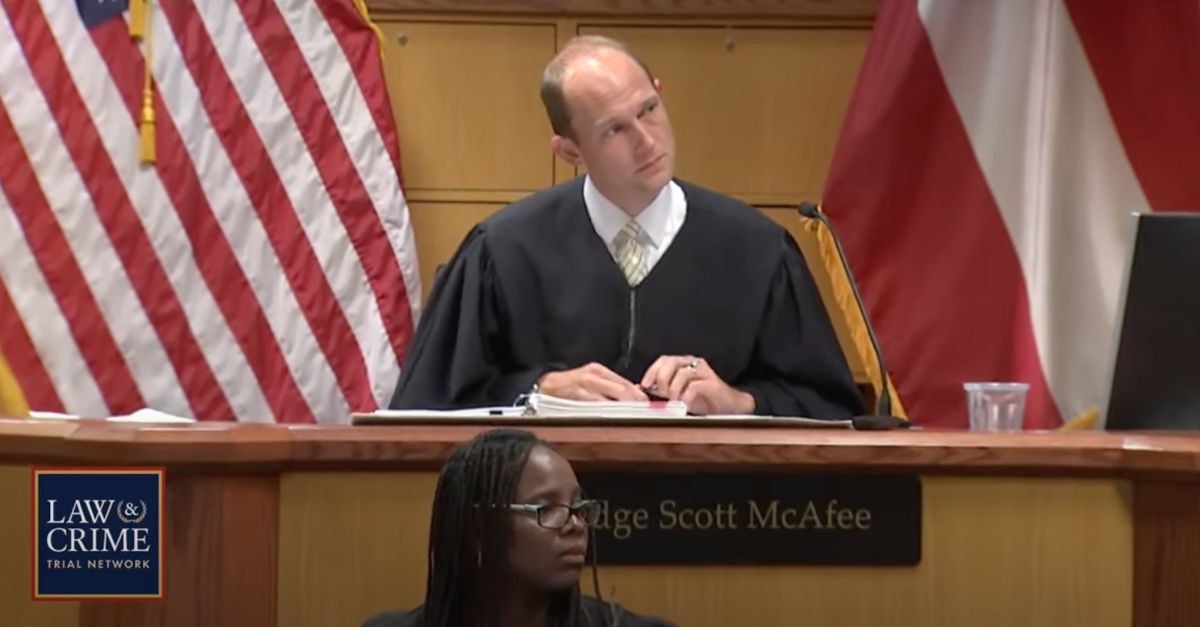
Fulton County Superior Judge Scott McAfee during a motions hearing on Oct. 5, 2023. (Law&Crime Network)
A Georgia judge on Thursday denied a motion by so-called “Kraken” lawyer Sidney Powell to dismiss the racketeering (RICO) and other charges she faces in Fulton County, telling her defense attorney that the trial court lacks the procedural authority to issue such relief.
Fulton County Superior Court Judge Scott McAfee appeared receptive to some of the claims and arguments advanced during the motions hearing by Powell’s attorney, Brian Rafferty, and suggested the defense had laid out a compelling case. The judge said he was bound, in the end, to let the disputed facts be decided by a jury.
Powell notched a smaller victory on an earlier-filed motion that accused the prosecution of failing to turn over potentially exculpatory evidence to the defense. McAfee said he would issue an order directing prosecutors to “double- and triple-check” their files so that there were no issues over Brady material during the trial.
In 1963, the U.S. Supreme Court ruling, Brady v. Maryland, held that prosecutors must disclose any evidence in their possession that can help the defendant. Suppression of such evidence constitutes “a violation of the Due Process Clause of the Fourteenth Amendment.”
Rafferty told the court that he has been raising Brady issues since the first hearing held in the case against his client.
Powell and “coup memo” co-author Kenneth Chesebro are currently slated to go on trial beginning Oct. 23. They both face charges over their efforts to overturn the results of the 2020 election. The two attorneys previously exercised their speedy trial right and will be tried separately from the other high-profile, pro-Donald Trump defendants.
Powell faces seven counts related to her alleged dealings with SullivanStrickler LLC, her alleged role in a conspiracy to commit election fraud by tampering with voting machines in Coffee County, and for allegedly violating Georgia’s homegrown version of the Racketeer Influenced and Corrupt Organizations Act.
She has pleaded not guilty to all the charges.
“I’ve been expressing concerns about Brady from the beginning,” Rafferty said as the motions hearing began. The attorney elected to begin with the Brady motion, he said, because those issues formed the basis of the defense’s since-denied motion to dismiss.
To hear the defense tell it, Powell was not involved in any events that occurred in Coffee County; and to the extent that anything untoward occurred in Coffee County, there were official communications from a government employee there that purported to authorize the breach of sensitive elections equipment.
“She had nothing to do with Coffee County – I’ve been saying it over and over again,” Rafferty said – outlining his client’s case in broad strokes. “Whatever happened in Coffee County, whoever was involved, whoever was responsible, that conduct was authorized.”
Powell’s attorney went on to say that the government searched through 10,000 emails belonging to former Coffee County elections supervisor Misty Hampton. During that search, Rafferty said, the government found seven emails “all of which are exculpatory” as to his client and that were not produced to the defense.
One exculpatory piece of information cited by the defense attorney was a letter by Hampton that purported to authorize the Coffee County election inspection process. That letter was not addressed to Powell or otherwise had anything to do with her, Rafferty said.
“They had it the whole time,” he said, “What’s troubling your honor is not just that when I asked for it, they didn’t produce it. What’s troubling is that they had it before this case was ever presented for indictment in August of 2023. And it shows that this was authorized. And that information couldn’t have possibly been presented to the grand jury because the government [said they] didn’t even know it existed.”
Hampton herself was charged in the sprawling, 98-page, 41-count criminal indictment along with 18 co-defendants.
After the defense attorney finished his argument, the court asked for the legal authority to dismiss the case. There, Rafferty cited a case issued by the U.S. Court of Appeals for the Ninth Circuit. The court noted that no Georgia court had ever adopted the holding and that, oppositely, the 11th Circuit had expressly disavowed that holding.
“You’re asking me for something that the trial court does not have the authority to do,” McAfee said.
During the government’s relatively brief reply, Fulton County Deputy District Attorney Will Wooten took umbrage at Rafferty’s claims.
“They’re outrageous; they’re not true,” the ADA said. “He’s shown no evidence of prosecutorial misconduct because there was none. It’s offensive and it’s inappropriate given the serious nature of this type of allegation.”
Wooten went on to argue that Powell’s defense had produced “no evidence” to back up their claims of prosecutorial misconduct.
The state went on to accuse the defense of raising false Brady claims over evidence they actually did have in their possession.
The judge, however, was not interested in that line of argument.
Rather, McAfee seemed inclined toward sympathy for the idea that the government might have produced potentially exculpatory information in a large document dump. The judge asked the state what they could do to address the “needle in a haystack allegations” while also telling Rafferty the state can’t be expected “to highlight for you.”
Wooten, in response, said the folders in the terabytes of data provided to the defense are clearly marked and organized. Rafferty countered to say he only found exculpatory information in a folder marked “Miscellaneous” – but not in the folder marked “Coffee County.”
“It almost feels like we’re shadowboxing a ghost here,” the judge said, about the Brady concerns. At first, McAfee said he was unsure what the defense actually wanted the state to do to try and correct the perceived deficiencies. Rafferty was happy to offer specifics.
Ultimately, the judge settled on promising that the court would file an order that would direct the prosecution to thoroughly review their transcripts and witness interviews for potential exculpatory information. Rafferty was given 24 hours to submit a proposed order that could include additional discovery obligations to the state.
Have a tip we should know? [email protected]







